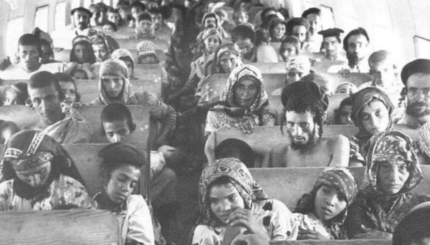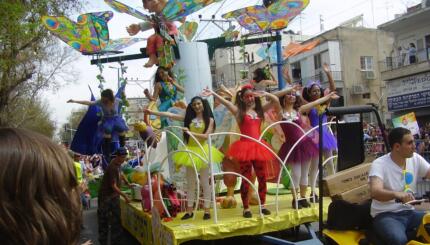There’s a new type of going on in Israel. Kiruv, which literally means “bringing something close,” refers to religious outreach. It usually calls to mind pictures of dancing rabbis pouring out of vans, putting tefillin on people’s arms and giving out candles.
Yehuda Katz and the people behind Artists and Musicians for Israel, have something different in mind. For one thing, they’re all creatives — Katz himself, the founder of AMI, is a guitarist and singer for the hippie-religious-rock band Reva l’Sheva. Other AMI leaders include kabbalistic photographer Eliyahu Alpern, scribe Shoshana Gugenheim, and a bunch of different artists. Their stated goal is to engage the next generation — that is, classes of kids and show them, from a personal level, why Israel and Judaism are cool.
All the A’s and M’s of AMI are Israeli, and most of their work is done in Israeli schools, but they’ve just started running programs in the United States as well — curiously enough, in schools and synagogues of all denominations. We spoke to Katz about his programs, his coworkers, rock and roll and religion, and what it’s like to inspire kids … both on the stage and off.
MJL: When did the big transition away from religious education in Israeli secular schools begin? I remember even in the early ’90s, they were teaching Tanakh in schools…
Yehuda Katz: I have had the zchut [merit] to live in Eretz Yisrael since mid-1993. I specifically remember a time within a few years after our arrival that there was a clear cut move away from require Tanach and other Jewish content matter from the school curriculum. I can not specify the extent of the drawback. I do know that I have read numerous articles about the lack of knowledge of with today’s Israeli teens, as opposed to people who are today in their 40s and older, where something written in Torah was seen as an indelible part of “our” history.
Is your program designed more to bring music to kids who are already up on their Judaism, or to bring Judaism to kids who already like music? Does kiruv ever happen in the other direction?
Our program is designed to bring an identity with a specific lesson and character in Judaism to the less-knowledgeable student by using music and art as means of touching their hearts — which, in turn, asks them to look inside their souls and try to understand how and why they connect to the message.
We do so using creative tasks that allow the student to express themselves as Jews through the creation of new art forms such as lyric writing, composition, drawing, and dramatic presentations.
What does a regular workshop look like? Do you initially call up a school, or do schools come to you?
A number of Mechinot have contacted us. Their staff, while very strong at teaching challenging and inspiring intellectual Jewish content, have felt at a loss to touch the neshamot [souls] of their students. We try to fill that role for them. We try to help students answer the question, “Why didn’t anyone tell me about who I really am?”
We work with school staff to choose the workshops that should be most appropriate for their student body. All of our workshops in high schools are built around Jewish holiday s tot offer a different perspective of the Jewish calendar then what non-dati [religious] students are accustomed to.
A workshop includes both contact and creativity where the student is challenged to look inside himself and to offer a forum for self-expression where there are no wrong answers.
Are chilonim ever skeptical to or hostile about your programs? Do people worry about you guys making their kids religious?
The bottom line for us is to really care about each student that we come in contact with, and to talk to them, to the place where they are. Both the music and art pieces are utilized in a similar way — as means for students to express themselves artistically after they have discussed content that may be totally new to them as Jews and Israelis.
As we are not trying to make kids religious, people are less skeptical because they don’t detect a hidden agenda, which obviously, does not exist.
On a whole we have found a tremendous desire among young Israeli students who are seeking answers to questions like, who are we? Why did our parents commit to life in Israel? Why does one segment of the population seem to have a monopoly on Jewish literary treasures like the Torah? How can I be a part of helping make our country and society more truthful and honest?
Artists and Musicians for Israel is currently booking for schools. You can find out more about them at Artists.org.il.


